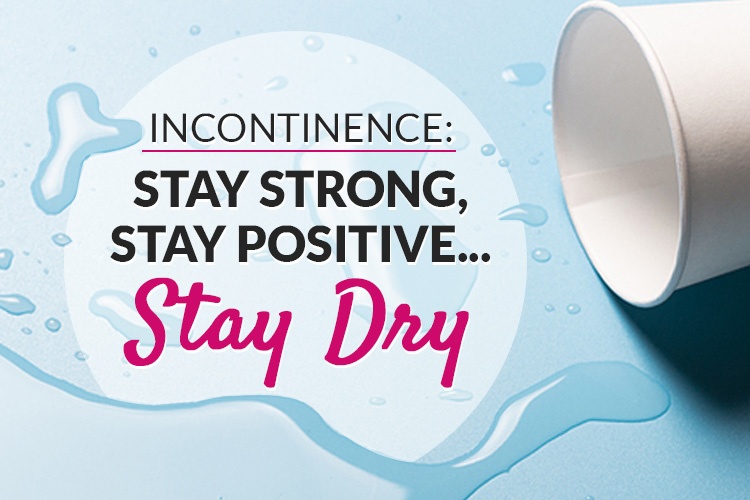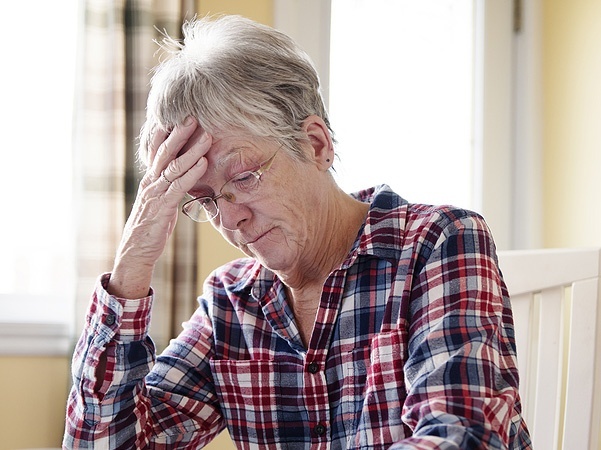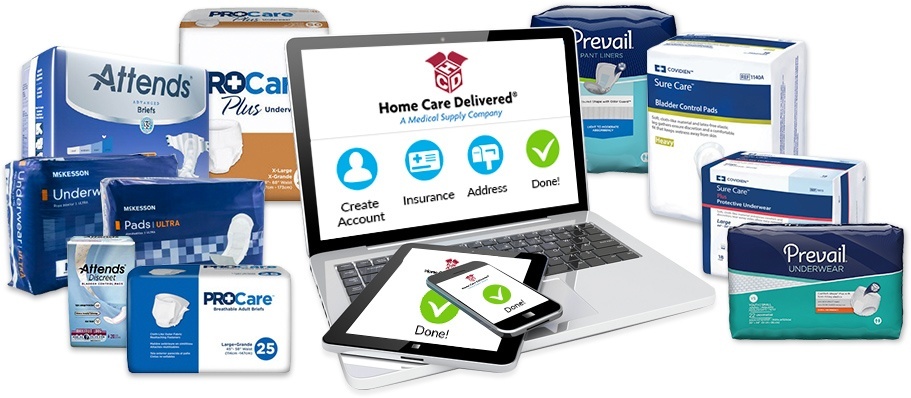Incontinence: Stay Strong, Stay Positive… Stay Dry
The more you know about incontinence, the more successfully you can manage it.
This post was reviewed by our Director of Clinical Excellence and Oversight.
When you watch your favorite athlete play, or your favorite singer perform, it’s hard to imagine they might be among the 35 million Americans living with urinary incontinence. In fact, bladder control is a problem that can affect anyone, even self-assured celebrities!

Two common types of incontinence are stress incontinence and urge incontinence, commonly associated with an overactive bladder. Stress incontinence is often due to weak pelvic muscles. It might cause you to leak when you cough, sneeze, laugh, exercise, or lift something heavy. Overactive bladder (urge incontinence) can result from a minor condition like an infection, or more serious issues like diabetes or a neurologic disorder. Some foods and liquids can also trigger urge incontinence. Urge incontinence can feel like a sudden, intense urge to go, followed by an involuntary loss of urine.
Incontinence can also be a symptom of other health conditions. Factors that increase the risk of incontinence include pregnancy, childbirth, high blood pressure, and obesity. Women generally are at higher risk than men.
Incontinence can range from an annoyance—that tiny dribble when you laugh or sneeze—to a serious problem that prevents you from performing daily activities. The more you know about your leaky bladder, the more successfully you can manage it. Read on for information and helpful hints.
DIY? Maybe!
Some people with urinary incontinence may find that making lifestyle changes is enough to keep them comfortable and protected. It’s important to see the doctor and learn what treatment options are available. Here are a few self-care tips which might reduce those embarrassing leaks.
Right-size your liquids. The key, according to the National Institutes of Health, is to drink the right amount at the right time. How much to drink depends on the type of incontinence you have and your level of activity, your general health, and the climate where you live. Some people avoid nighttime bathroom trips by cutting off liquids a few hours before bedtime. Be sure to ask your healthcare provider if limiting liquids at night is OK. It’s important to balance your liquid intake with your daily activities so that you don’t become dehydrated as this can make urinary incontinence worse.
Consume with care. Certain foods and drinks can trigger bladder problems. For some people, avoiding foods and drinks that contain caffeine, such as coffee, tea, and chocolate, as well as carbonated beverages, acidic foods like tomatoes and citrus, and sugar, honey, and artificial sweeteners can help reduce leakage. If you take over-the-counter supplements, check the ingredients.
Watch your weight. As with many chronic conditions, the risk of developing urinary incontinence is higher if you are overweight or obese. Dropping excess pounds can reduce leaks and, in some cases, may actually prevent the problem.
Stay active. It’s true that some types of exercise can lead to leaks. But improved strength, endurance, and balance (i.e. better overall fitness) can actually help fight incontinence. The key is to find a form of exercise that you like, and one you’ll stick with. As part of your workout, strengthening the muscles that support the bladder and nearby organs (known as the pelvic floor muscles), can reduce symptoms of incontinence. Some recommended exercises are specific to men or women, while others, like Kegel exercises, can be done by anyone. Be sure to check with your healthcare provider before starting an exercise routine.
Get regular. It may seem odd, but constipation is a risk factor for urinary incontinence. In fact, some medications used to treat urinary incontinence can actually cause constipation. The right balance of liquids and fiber in your diet can help you become more regular. Talk to your doctor about ways to avoid constipation that won’t worsen your bladder problems.
Find the products that work for you. The right products can help you feel less anxious and ensure you have the confidence to do all the things you love to do. Ordering online can reduce the embarrassment of shopping for highly personal products in a public place. From pads, liners, and protective underwear to skin cream and odor-fighters, there are lots of options for bladder-control products.
Be prepared. Create an emergency kit that stays with you at work, in the car, or wherever you spend a lot of time. Fill a jumbo zip bag with your favorite pads or liners, as well as a change of underwear and pants, plus wipes, and gloves. Knowing that emergency supplies are close at hand can help you move more confidently through your busy day.
Don’t Face Incontinence Alone
If self-care and new habits don’t give you the relief you need, make an appointment with your healthcare provider. Depending on your examination and tests, you may be prescribed medicine, a medical device, or surgery to treat a blockage or other problem. If you have Medicaid and some private insurance coverages, your incontinence supplies may be covered under your plan.
If you do plan to visit the doctor, make notes about your bathroom habits (including what you eat and drink and any accidents) and bring the notes to the appointment.
Mind Your Emotions
Be honest about the emotional toll of incontinence. Bladder problems can be embarrassing, and can lead to anxiety and depression in some people. Talk to a spouse or partner, or share your story with a trusted friend. You may discover someone close to you has wisdom to share. Check with your doctor about incontinence support groups in your area.

Stay strong and upbeat. The steps you take can do much to reduce leaks and increase peace of mind!
HCD Is Here to Help
The experts at HCD can help you find the insurance-covered incontinence products that will work best for you. We have a wide range of incontinence supplies available and the supplies can be shipped right to your door. Best of all, if you qualify, we handle all the paperwork and will work directly with your healthcare provider and insurance company to make sure you get all the benefits available to you. Let us give you a call by entering your phone number on the bottom left of the screen. We are eager to help. Call us or enroll online today.

Get Incontinence Supplies Online With Medicaid
No Credit Card | Fast Delivery | 100% Discreet

Disclaimer:
Unless otherwise noted, the recommendations in this document were obtained from the sources indicated. Be advised that information contained herein is intended to serve as a useful reference for informational purposes only. HCD cannot be held responsible for the continued accuracy of or for any errors or omissions in the information. All trademarks and registered trademarks are the property of their respective owners.

